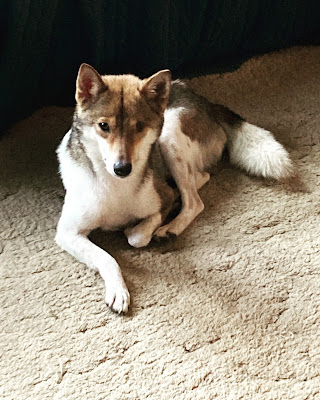I understand dogs a great deal better than I understand my fellow humans.
Dogs are straightforward. They interact with their world in a direct way, whether it be motivated by love, anger, curiosity, hunger, enthusiasm, or fear. There's nothing feigned about a dog's emotions or the way they express them. I've sometimes misinterpreted one of my dogs' signals, but that's on me; the signals were there, even if I only recognized them in retrospect. Once you grok dog behavior, it's much less fraught than the complex, confusing morass of human interaction.
This is why when I'm invited to social events, I'm always hoping the host will have a dog so there'll be someone for me to have a conversation with.
The dogs we've had have nearly all been rescues, and came with all the baggage and bad backstories that rescue dogs have, but one and all were and are wonderful companions, and enriched our lives tremendously. This latter part is the only possible explanation for why during the holidays, my wife and I were looking around and thinking, "Wow, our house sure has a lot of clutter and dirt and chaos. We never seem to be able to keep up with the housekeeping. Hey, I know... let's get a puppy!"
So, without further ado, allow me to introduce to the Skeptophilia readership...
... Jethro.
In the few days we've had Jethro, he's already bonded with our other two dogs, Guinness and Rosie. Rosie is an Australian Cattle Dog mix who pretty much loves everyone, so she was easy.
Guinness is a big galumphing American Staffordshire Terrier/Husky/Chow cross who can be cranky and gets jealous easily, especially when it comes to sharing Carol's attention with anyone, because he's a big ol' Mama's Boy. He is, however, a very natty dresser.
Like with most rescues, we're not sure what kind of a mix Jethro is. Jane at Stay Wild said she thought he had some Golden Retriever in him, which makes sense given his silky coat and general head shape, but his striking and beautiful black face and brindle coloration have to come from somewhere else. He's got huge paws, indicating he's got some serious growing to do, but whether he'll turn out to be long and lanky or barrel-chested and stocky is anyone's guess. Dog-loving friends of mine have speculated a lot of possible contributions to his ancestry -- suggestions have included various spaniels and setters, Border Collie, Boxer, German Shepherd, even Saint Bernard -- but we won't be sure until we have him DNA-tested. (The kit has already been ordered.)
It's tempting to say his lovable, playful temperament is indicative of his Golden Retriever genes, but a surprising study at the University of Massachusetts just last year found the contribution of breed to behavior is way smaller than most people think. We often associate particular behavioral traits with certain types of dog -- labs are friendly and loyal, hounds laid-back but stubborn, Dalmatians nervous and prone to biting, and so on -- but the researchers found exceptions to the rule are so common that the rule isn't really a rule. And while we've had dogs who seemed to conform to the breed expectations, all of them have their own unique characteristics and quirks.
Dogs are as varied in personality as people are, I suppose.
In any case, now we've got three dogs. I commented yesterday that this means we're outnumbered, and that it's a good thing this is a benevolent dictatorship and not a democracy. Although a friend of mine responded, "I'm sure your dogs would vote for you anyway."
Given the fact that Jethro is snoozing happily right next to me, I suspect my friend is right.
****************************************
 |





